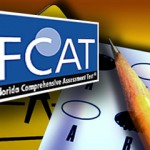Is Gov. Scott’s Testing Proposal A Trojan Horse For Vouchers?

John O'Connor / StateImpact Florida
Gov. Rick Scott speaks at a dinner hosted by a school choice group in Tampa.
Teacher’s unions and critics of Florida’s various private school scholarship programs have long argued that students who received those scholarships should have to face the same scrutiny as public school students.
That means taking the Florida Comprehensive Assessment Test — or its upcoming successor — in order to make apples-to-apples comparisons between school performance.
But do public school advocates need to be careful what they ask for?
Could requiring private school students to meet the same requirements as public school students undercut the legal basis for the 2006 Florida Supreme Court decision which ruled a broad private school voucher program unconstitutional?
After hearing Scott’s proposal, I immediately thought of the 2006 Florida Supreme Court decision in Bush vs. Holmes. I wondered if Scott’s proposal might open the door for vouchers to return so I ran it by a couple of people.
At issue in the 2006 decision was the Opportunity Scholarship Program. The program allowed students at schools which had received a failing grade twice in a four-year period to receive vouchers for use at private schools.
The judges hung their decision outlawing the program on constitutional language which requires the Legislature provide a “uniform, efficient, safe, secure and high quality system of free public schools.”
“This diversion not only reduces money available to the free schools but also funds private schools that are not ‘uniform’ when compared to each other or the public system,” the court majority wrote in its opinion. “Many standards imposed by law on the public schools are inapplicable to the private schools receiving public monies.”
Gov. Rick Scott wants private schools which accept tax credit scholarship to take the same tests as public school students.
Much depends on what Scott’s proposal would actually require — and no one at StateImpact Florida is qualified to offer legal advice. A court could just emphasize other words in that constitutional section to justify the prior decision — such as “public.” And the Legislature might never mandate private schools to meet every requirement which public schools must — thus ensuring things will never be “uniform.”
But it sure seems that requiring tax credit scholarship students at private schools take the state standardized tests is a big step toward uniform standards for students in public schools and private schools.
Mark Pudlow, spokesman for the Florida Education Association teacher’s union, said he hasn’t considered that possibility.
“I don’t know about that,” Pudlow said, who admitted he hadn’t thought about the possibility. “We’ve long said that private schools that take public money should abide by the same standards.”
Jon East handles policy for Step Up For Students, the Tampa non-profit which administers the state’s private school tax credit scholarship for low-income students.
East doesn’t believe requiring tax credit scholarship students to take Florida’s standardized test is likely to pave the way for the return of a broader voucher program. East says it’s more likely that the Bush vs. Holmes decision could limit other choice programs which operate outside the requirements of traditional public schools — perhaps even the online Florida Virtual School.
“It’s hard to know what that means for future cases,” he said.
But East also argues all Florida students have a uniform opportunity for school choice. That’s what should matter, he says, not whether every public education dollar spent is done so under the same requirements, mandates or restrictions.
East said that private schools educate students in different ways, and therefore a one-size-fits-all accountability system might not be appropriate.

